Enhanced local and systemic anti-melanoma CD8+ T cell responses after memory T cell-based adoptive immunotherapy in mice
- PMID: 27011014
- PMCID: PMC4857203
- DOI: 10.1007/s00262-016-1823-8
Enhanced local and systemic anti-melanoma CD8+ T cell responses after memory T cell-based adoptive immunotherapy in mice
Abstract
Adoptive cell transfer (ACT) melanoma immunotherapy typically employs acutely activated effector CD8+ T cells for their ability to rapidly recognize and clear antigen. We have previously observed that effector CD8+ T cells are highly susceptible to melanoma-induced suppression, whereas memory CD8+ T cells are not. Although memory T cells have been presumed to be potentially advantageous for ACT, the kinetics of local and systemic T cell responses after effector and memory ACT have not been compared. B16F10 melanoma cells stably transfected to express very low levels of the lymphocytic choriomeningitis virus (LCMV) peptide GP33 (B16GP33) were inoculated into syngeneic C57BL/6 mice. Equal numbers of bona fide naïve, effector, or memory phenotype GP33-specific CD8+ T cells were adoptively transferred into mice 1 day after B16GP33 inoculation. The efficacy of ACT immunotherapy was kinetically assessed using serial tumor measurements and flow cytometric analyses of local and systemic CD8+ T cell responses. Control of B16GP33 tumor growth, persistence of adoptively transferred CD8+ cells, intratumoral infiltration of CD8+ T cells, and systemic CD8+ T cell responsiveness to GP33 were strongest after ACT of memory CD8+ T cells. Following surgical tumor resection and melanoma tumor challenge, only mice receiving memory T cell-based ACT immunotherapy exhibited durable tumor-specific immunity. These findings demonstrate how the use of non-expanded memory CD8+ T cells may enhance ACT immunotherapeutic efficacy.
Keywords: Adoptive transfer; Effector; Immunotherapy; Melanoma; Memory; T cell.
Conflict of interest statement
All authors have declared that there are no financial conflicts of interest with regard to this work.
Figures
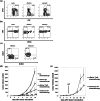
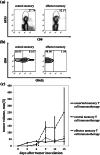

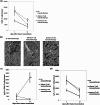
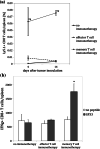
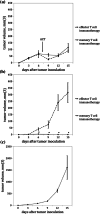
References
-
- Rosenberg SA, Yannelli JR, Yang JC, Topalian SL, Schwartzentruber DJ, Weber JS, Parkinson DR, Seipp CA, Einhorn JH, White DE. Treatment of patients with metastatic melanoma with autologous tumor-infiltrating lymphocytes and interleukin 2. J Natl Cancer Inst. 1994;86:1159–1166. doi: 10.1093/jnci/86.15.1159. - DOI - PubMed
-
- Rosenberg SA, Yang JC, Sherry RM, Kammula UW, Hughes MS, Phan GQ, Citrin DE, Restifo NP, Robbins PF, Wunderlich JR, Morton KE, Laurencot CM, Steinberg SM, White DE, Dudley ME. Durable complete responses in heavily pretreated patients with metastatic melanoma using T-cell transfer immunotherapy. Clin Cancer Res. 2011;17:4550–4557. doi: 10.1158/1078-0432.CCR-11-0116. - DOI - PMC - PubMed
-
- Dudley ME, Wunderlich JR, Yang JC, Sherry RM, Topalian SL, Restifo NP, Royal RE, Kammula U, White DE, Mavroukakis SA, Rogers LJ, Gracia GJ, Jones SA, Mangiameli DP, Pelletier MM, Gea-Banacloche J, Robinson MR, Berman DM, Filie AC, Abati A, Rosenberg SA. Adoptive cell transfer therapy following non-myeloablative but lymphodepleting chemotherapy for the treatment of patients with refractory metastatic melanoma. J Clin Oncol. 2005;23:2346–2357. doi: 10.1200/JCO.2005.00.240. - DOI - PMC - PubMed
Publication types
MeSH terms
Substances
Grants and funding
LinkOut - more resources
Full Text Sources
Other Literature Sources
Research Materials

